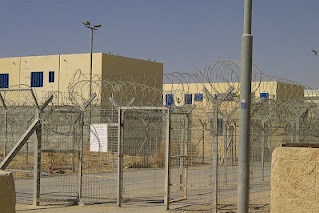 Saharonim Detention Center
Saharonim Detention CenterThe High Court of Justice has ordered the State to provide the Court with additional information about a third country with which it is allegedly in negotiations on the transfer of thousands of Eritrean asylum seekers. An explanded panel of nine Justices spent all day yesterday hearing the petition to overturn a controversial amendment to the Law to Prevent Infiltration, which allows the government to automatically detain asylum seekers indefinitely.
A yet-unnamed third country willing to resettle thousands of refugees has repeatedly been hinted at by government officials as a potential solution to the large waves of asylum seekers who entered Israel over the past decade. Rather than accept the situation and explore solutions such as the implementation of internationally-recognized refugee status determination (RSD) standards and the provision of temporary work permits to qualifying migrants, successive governments have chosen to do nothing, allowing the asylum seekers to remain in Israel, but refusing to take steps to regulate their status or allow them to work and support themselves. Instead, the government has spent billions of shekels on a giant detention center in the Negev, and passed a law that authorizes the indefinite detention – without a trial – of persons who entered the country illegally.
Approximately 2,000 people, including victims of torture and at least a dozen children, are currently being detained under the law. The vast majority of the detainees are citizens of Eritrea and Sudan – countries whose citizens, according to the government’s own directives, cannot be deported due to the threat to their lives. Israeli and international law prohibit the detention of migrants other than for the purpose of deportation. Moreover, detaining asylum seekers who suffered torture camps in Sinai is likely to substantially aggravate their poor health and welfare. The state’s interest in deterring new asylum seekers from arriving in Israel is neither a sufficient nor constitutionally valid justification for the detention of those who have already arrived.
During the course of yesterday’s hearing, the second on the petition, Yochi Gnessin of the State Attorney’s Office attempted to portray the automatic detention of illegal immigrants as a stopgap measure to be alleviated by the forthcoming deal with an undisclosed third country.
Attorney Yonatan Berman of the Clinic for Migrants’ Rights at the College of Law and Business: “Regardless of a potential resettlement arrangement with a third country, The Infiltration Law is one of the most extreme laws ever legislated in Israel. It abuses innocents, including women and children, refugees and victims of torture, whose only sin was fleeing for their lives. It is a stain on our law books and we have a legal and moral obligation to overturn it.”
The original petition to invalidate the amended law was submitted in October 2012 by:
- Attorney Yonatan Berman of the Clinic for Migrants’ Rights at the Academic Center of Law and Business in Ramat Gan,
- Attorney Anat Ben Dor of the Refugee Rights Clinic at the Tel Aviv University Faculty of Law,
- Attorney Oded Feller of the Association for Civil Rights in Israel (ACRI), and
- Attorney Asaf Weitzen of the Hotline for Migrant Workers.
ASSAF, The African Refugee Development Center (ADRC), and Kav La’Oved are also named as petitioners.
The petition was filed on behalf of the organizations and five Eritrean asylum seekers being detained under the law (four of whom have since been released pending the Court’s decision).
Related Materials







